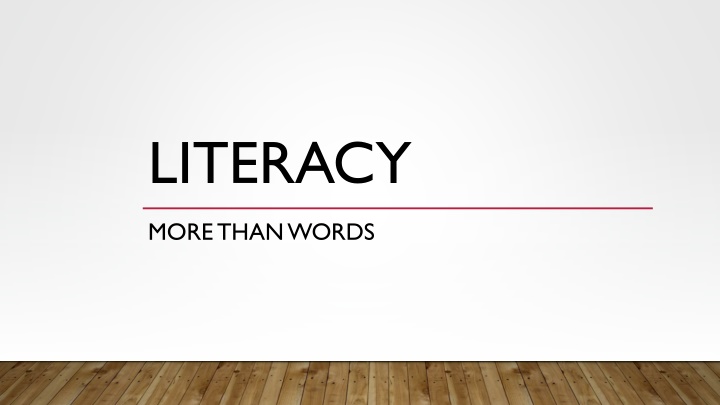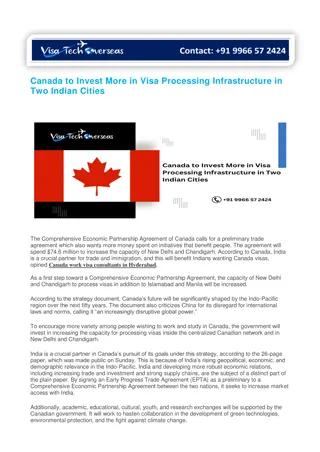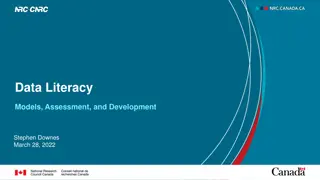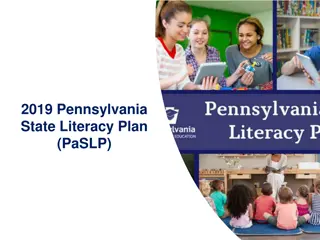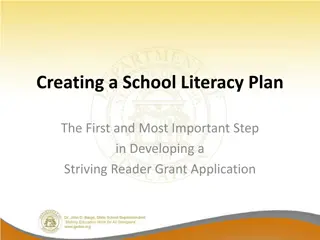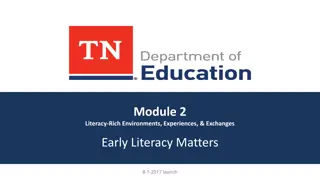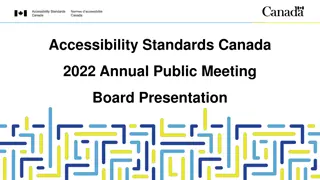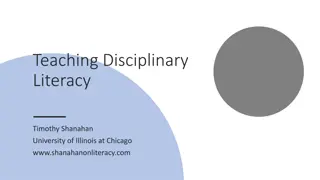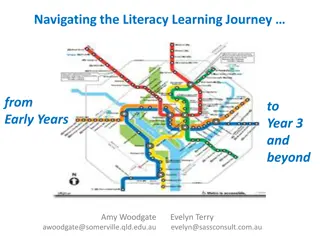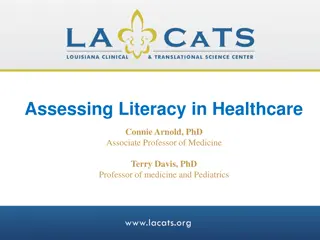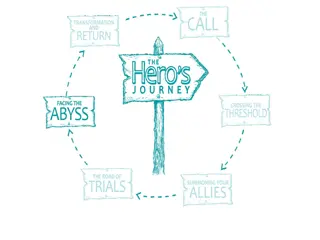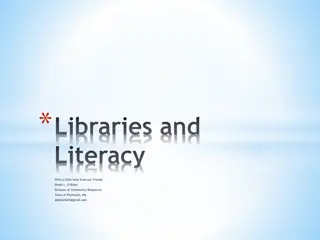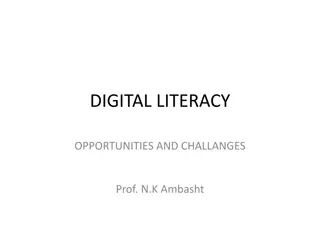Understanding Literacy in Canada
Literacy is more than just words - it's the ability to read, write, speak, listen, and use numeracy and technology to express ideas, solve problems, and participate fully in society. Learn about how literacy is measured, the challenges faced in Canada, and factors affecting literacy skills in the population.
Download Presentation

Please find below an Image/Link to download the presentation.
The content on the website is provided AS IS for your information and personal use only. It may not be sold, licensed, or shared on other websites without obtaining consent from the author.If you encounter any issues during the download, it is possible that the publisher has removed the file from their server.
You are allowed to download the files provided on this website for personal or commercial use, subject to the condition that they are used lawfully. All files are the property of their respective owners.
The content on the website is provided AS IS for your information and personal use only. It may not be sold, licensed, or shared on other websites without obtaining consent from the author.
E N D
Presentation Transcript
LITERACY MORE THAN WORDS
WHAT IS LITERACY? Literacy is the ability to read, write, speak and listen as well as to use numeracy and technology at a level that enables people to express and understand ideas and opinions, to make decisions and solve problems, to achieve their goals, and to participate fully in their community and in wider society.
MEASURING LITERACY Literacy is measured on a scale from 0 to 500 points in testing and in four skillsets. The Government of Canada has set Level 3 as a minimum literacy that people need to cope with the increasing demands of our society. The Conference Board of Canada believes that in an information society, people need a score of at least 300 to be employable.
HOW DOES CANADA MEASURE UP? 58 of 100 adults in Canada aged 16 to 65 have the basic reading skills they need for most everyday tasks. The average score for Canadian adults in prose literacy and document literacy is near the bottom of Level 3. That means that about two in every five Canadian adults 9 million people can t read well enough to do everyday things. If we add in the people who are older than 65, that number goes up to 12 million Canadians. The average for numeracy and problem solving is just below Level 3. Only 45 of 100 adults in Canada aged 16 to 65 can do everyday arithmetic and understand the numbers in printed materials.
LOW LITERACY IN CANADA From the International Adult Literacy and Skills Survey we can make some broad statements about who has low literacy skills in Canada. 2.6 Million have post-secondary education 3.3 Million have finished high school 5.8 Million are employed 3.1 Million have less than high school education 2.4 Million are not active in the workforce 2.6 Million are immigrants
WHAT DO WE KNOW? Men are more likely to have low literacy skills than women. Some children had learning disabilities or social problems when they were in school, and never became good readers. Many people don t read regularly and gradually, they lose their reading skills. Many senior citizens have only elementary school education, and even if their literacy skills met standards at one point, they ve lost those skills. Regardless of how literate an immigrant is in there first language, they may still have trouble learning English or French. Even those immigrants whose first language is English or French have lower literacy than those people born in Canada.
LITERACY IN NEW BRUNSWICK New Brunswick continues to do worse than the national average. The Early Years Evaluation Direct Assessment reveals that up to 30 per cent of young children are having difficulty. Canada-wide assessments show that with the exception of Manitoba, New Brunswick Grade 8 students lag behind their Canadian counterparts in reading. 20% NB University graduates demonstrated low literacy skills. This is expected to grow to 24% by 2031. The average adult literacy score in New Brunswick is at a Level 2. One in 5 New Brunswickers (18.5%) have literacy levels below that average.
HOW DOES LOW LITERACY AFFECT PEOPLE? Parents may not be able to help their children with homework, or to understand letters they receive from the school. People may have difficulty understanding the newspaper, so they don t find out about important community notices and other information. Drivers who get tickets may not be able to understand the instructions on the ticket. This could cause more legal problems for them. People who can t understand contracts and due dates may get into financial and legal difficulties. People who have poor literacy skills may also have trouble organizing information, following a line of reasoning (even when the information is given orally), and keeping track of a set of instructions.
WHY DO WE NEED TO IMPROVE LITERACY? A study of 14 OECD countries, over 34 years, found that what was most important for economic growth was a country s average literacy score. The World Literacy Foundation estimates that the cost of illiteracy in Canada is $42.5 billion. Increasing the proportion of Canadians who achieve Level 3 literacy by just 1% would result in a permanent $18 billion/year increase in our GDP. Raising literacy levels from Level 1 to 3 significantly improves the chances a person will get a job and increases their wage rate by at least 25%.
LAUBACH LITERACY EACH ONE, TEACH ONE Laubach Literacy New Brunswick is a non-profit, charitable organization whose trained volunteers help New Brunswick adults improve their basic reading, writing and math skills through a free and confidential program. Our volunteers work one-on-one with learners using materials suited to the learner s literacy level and daily lives.
LAUBACH TEACHING METHOD The Laubach Way to Reading is a basic reading and writing course for adults and young adults. Even students with little or no reading experience can begin learning with success from the very first lesson. The Laubach Method starts with the known the spoken word and moves to the unknown the written word in easy steps that elicit the correct response from the student so that positive reinforcement begins immediately. The emphasis is on learning by association rather than by habitual repetition, thus also emphasizing reading comprehension skills.
WHAT DOES LLNB DO? #1 Train Volunteers Volunteer tutors are given an orientation to literacy and 20 hours of basic tutor training. Tutors then have access to a variety of teaching and learning materials as well as ongoing support from an LLNB Tutor Coordinator in their region. There are LLNB councils throughout the province. #2 Collaborate Work on broader issues of literacy and the barriers to literacy through strategic partnerships #3 Raise Funds To support the important work of LLNB and its volunteers.
CONCLUSION Literacy is one of the most important skills when it comes to our personal growth, culture and development. It is even more important today because of how our economy and society are changing. Challenges with literacy affect all the people of New Brunswick. LLNB works with partners and stakeholders to address these challenges head on, creating stronger and more resilient citizens, and a better New Brunswick.
FOR MORE INFORMATION Email: info@llnb.ca Call: 1-506-384-6371 (Moncton) Toll-free: 1-877-633-8899 www.llnb.ca Facebook.com/LaubachNB
